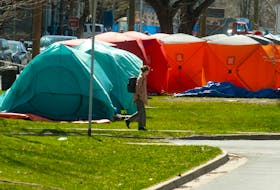Tara Luciani is expecting.
The 33-year-old owner of Forma Fitness Calgary and her husband Steve, a firefighter, are set to welcome the couple’s second daughter into the world on Aug. 10.
As they prepare for life with a new addition, they’re exercising caution in the wake of the global spread of COVID-19.
They are also preparing for the unknown.
“You can’t help but jump ahead and wonder how are things going to be different,” Luciani said. “The biggest thing for me is what going into a hospital is going to look like? And in three or four months’ time, if the world still is what it is, what is our situation going to look like? Is it going to be just the two of us and the new baby at home? How long are we going to have to wait for family to visit? How long is it going to be before grandparents and aunts and uncles can be part of this monumental moment in our family?
“That’s where my head goes because I think the health care professionals have a really good handle on things.”
This is the reality of mothers-to-be in Calgary that are dealing with the various changes, challenges, and worries surrounding their maternity appointments which are now spaced out between pregnant women and held during limited clinical hours.
Waiting rooms have accommodated physical distancing with less chairs. Postpartum appointments are limited to phone conversations only, if possible.
And appointments themselves are only limited to one person — the pregnant woman.
“There’s a certain level of bonding that happens with you and your husband during these appointments,” Luciani said. “That’s a big aspect that has changed. I had an ultrasound last week and my husband couldn’t even come into the waiting room. He had to drop me off at the door.
“During my last pregnancy, I remember how all of the ultrasounds went. That’s an aspect I found difficult. But, on the flip side, you want to respect the health care professionals and don’t want to put them in jeopardy. this is my last pregnancy and I want to remember those moments but we won’t get that opportunity because of COVID-19.”
This is the new normal as the health care system adheres to a worldwide standard that recommends less face-to-face appointments according to Dr. Fiona Mattatall an obstetrician and gynecologist at the Rockyview General Hospital.
However, Dr. Mattatall said, there are certain vitals — blood pressure of the mother, the baby’s heartbeat, fundal height, vaginal swabs — that must be done in-person.
“But can we space out those face-to-face physical visits with some phone visits, just to check in with how the mother’s doing, is the baby moving?” she said. “And, also, questions she has for me. We can do a lot of that by phone, our office is doing a lot more of that now, to find out how they are coping.
“Anxiety can be higher in pregnancy and this adds a whole other layer of complexity and uncertainty to the pregnancy.”
Time-sensitive ultrasound appointments and bloodwork at other centres around Calgary require a pregnant woman to leave her home and risk potential exposure.
Dr. Mattatall said that those places are taking precautionary measures also, recognizing the importance of these appointments.
“We can’t skip ultrasounds in pregnancy,” she said.
Dr. Mattatall said many pregnant women find it helpful to hear how maternal health care providers are protecting new mothers and their babies from the exposure of COVID-19 and ensuring their health and safety.
They’re also prepared should a pregnant mother become sick and exposed to the virus.
“There is a lot of work going on behind the scenes,” she said. “Things are very much the same but at the same time, everything has changed.
“Having a baby, bringing a baby into the world, looking after a newborn, none of that goes on pause with what is going on with the pandemic.”
Meanwhile staff and volunteers from the Calgary Pregnancy Care Centre have been reaching out to clients as much as possible, checking in on their physical and emotional well-being, arranging for pick-ups and drop-offs from the Calgary Food Bank, offering prenatal classes online and trying to provide support where they can while maintaining proper physical distancing.
“How do you support a client that, for instance, has just had a stillborn?” said Calgary Pregnancy Care Centre executive director Jutta Wittmeier. “Or a new mom that needs groceries but she can’t get out because she has a newborn or little children? We’re trying to mobilize some of our volunteers and we’ve received a tremendous response. We’ve been trying to find out what resources clients need and assess appropriately and provide where we can because this is a pretty vulnerable community.”
The current societal challenges has made it even more difficult for their clients who can be socially isolated to begin with.
“We tend to see clients that are already fairly stressed,” she said. “But we’re definitely seeing more worry and anxiety.”
Wittmeier said that the hoarding of things like formula and diapers impact their clients who are in desperate need of those vital items for newborns.
She also said their team is on high alert for cases of domestic violence and addiction.
“Domestic violence tends to increase during pregnancy,” she said. “So, if you have the double combination of the stress and economic situation and pregnancy and people being at home together, that makes it even more difficult … and if you are anxious and housebound, where do you go? You go to your addiction. That adds another level of stress. It’s a normal response to stress if you’ve had trauma or abuse in your background. This is a reality.
“These kinds of people need more support in a time like this.”
Courtney O’Mahony, 33, and her husband Pat are expecting the couple’s first child on June 10. She said they both have been practising social distancing and trying to stay calm despite the uncertainty that swirls.
“I’ve done a tiny bit of research on what are the impacts on pregnant women and their babies,” she said. “So far, I’ve done my very best to stay away from getting into a Google black hole. I haven’t been doing a ton of research which has helped my anxiety a bit.
“I’ve just been trying to play by the rules, stay healthy, and stay inside.”
O’Mahony is now seeing her doctor every two weeks because of her rapidly approaching due date and is feeling confident about her delivery. She indicated that her and her husband are likely to be overprotective and cautious when their baby arrives with COVID-19 in the back of their minds.
She said there is some concern about the postpartum process which can be isolating in nature as the parents begin to bond with their new baby.
Will the city still be under strict physical distancing regulations?
“I don’t know if it makes me anxious or sad, but coming home and being super overwhelmed and, potentially, not being able to say to my mom — who lives here — ‘Hey, can you come over?’” she said. “You might be able to do that still because she’s been quarantined and it’s up to the individual. Having a baby and being in isolation already, your hormones are all over the place and as a new mom you don’t know what the heck you’re doing and not necessarily having that support.”
The delivery aspect has also changed amid COVID-19 precautionary measures as doctors and nurses remain up-to-date on the latest research world-wide.
In Calgary, maternity wards have prepared through simulations, for example, if a pregnant woman with COVID-19 enters the facility upon delivery.
Doctors and nurses would be wearing protective masks and gear while lactation consultants are prepared to protect newborns from transmission during breastfeeding.
According to a recent article in the Journal of the American Medical Association, a study of nine pregnant women found no mother-to-child transmission while controversy exists regarding whether COVID-19 can be transmitted in utero.
Dr. Mattatall points to another study that found no in-utero transmission (from an infected mother to her infant before birth) out of 36 pregnant women through testing of the placenta and amniotic fluid.
She also said they have not identified coronavirus in breastmilk.
“There are still a lot of question marks in all of this,” Dr. Mattatall said. “But at least the early information we’re getting is not as scary as a lot of us were worried it would be … we’re not seeing worse outcomes for pregnant moms compared with other women of the same age and we’re not seeing babies doing poorly with all of this.”
Dr. Mattatall said this is also good news when compared with the H1N1 outbreak a decade ago as that virus heavily impacted pregnant women compared with those who weren’t pregnant.
“That’s the thing that it’s a bit of a sigh of relief — it’s not as dangerous for pregnant women as (H1N1) was,” she said.
Dr. Mattatall said that it is not a matter of ‘if’ a mother will test positive for COVID-19, it’s a matter of ‘when.’
But she also said their teams are ready.
“I feel very lucky to be in Calgary,” she said. “We’ve got really good leadership in women’s health in the city and in the province that have been working 24/7 getting ready for this.
“As a women who is pregnant in Calgary, I don’t think you could be in a better place in the whole world.”
Even if things look a little different.
“It’s nothing anyone has ever experienced,” Luciani added. “You never really picture, ‘Oh this is something that could happen while I’m pregnant.’
“I wouldn’t say overall that my anxiety is higher. I’m just being more cautious.”
www.twitter.com/KDotAnderson
Copyright Postmedia Network Inc., 2020








